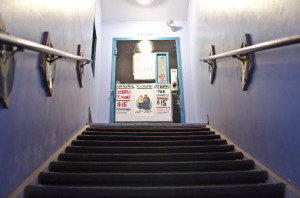Jerry Weber’s wonderland: a portrait of the collector
By Zach Brendza
Clad in sneakers, black shorts and a Jerry’s Records t-shirt, Jerry Weber sits atop the cash register podium pricing vinyl he recently purchased.
The podium, raised about a step off the ground, resembles that of a stage, and it’s not too farfetched to see it that way.
On this Wednesday afternoon, Jerry comes across a release by ‘70s funk band Step by Steps called “I Want to be in the Band!” which he has never seen before. He might not remember what’s on every album he has seen, but he remembers their covers and claims to have a photographic memory.
“One of the things I like about this job, that’s very seldom, is that you see a record you’ve never seen before,” Jerry says.
He has been taking the stage since 1976, when he opened the Record Graveyard in Oakland.
“I’m not a musician but it was like a dream to do something I love, make a living doing what I was doing anyhow, listening to music, going to shows,” Jerry said.
Jerry, now 65, has been working for 50 years with “no end in sight.” The white-bearded namesake of Jerry’s Records now lives where he works, sort of, in a sliver of a two-story warehouse in Aspinwall, a storage area that houses all the records that wouldn’t fit at his store on Murray Avenue. He keeps his best records close to him, in his room in the warehouse that is two times the size of Jerry’s Records.
He has been a lot of things in his life, job-wise. He was a mailman in the Hill District for 15 years, working out of Oakland Station, with a route that took him around the Fitzgerald Field House.
He was an usher at “all the ballparks,” including Forbes Field, Pitt Stadium and Three Rivers Stadium.
“I saw all the World Series, all the Steelers playoffs games, and I got paid.”
He was in attendance for the most memorable catch in Steelers history: the Immaculate Reception.
“I’ll tell you the truth. No one in the stadium knew what was going on. They just knew all the sudden the Steelers were jumping up and down in the end zone.”
As a school kid, he saw Bill Mazeroski’s iconic homerun in bottom of the 9th to win the 1960 World Series against the Yankees at Forbes Field.
He also served as a part-time Pitt policeman (proud of his record: he never made an arrest) as well as a security guard at the campus’ Hillman Library on Sundays. He’d walk the floors every second hour, sometimes getting the call to kick out a patron exposing himself to others.
But his lifelong love of music led him to the record business, leaving his various uniforms behind.
“I had to make a choice because I was taking too many days off because the store was getting bigger and bigger, “Jerry said. “I was driving myself crazy.”
That decision led to the birth of the Record Graveyard, which became Jerry’s Records in 1993.
Oakland has always been a home for Jerry, though. He grew up there and attended Central Catholic High School before he “got tossed out” after two years. Because of the proximity to Pitt, he is big a Panthers sports fan.
“When you grow up in Oakland, it’s your God-given right to never have to pay to get into any sporting event. If you don’t know how to sneak in, your father of your uncle or your brother or your cousin works the ticket [booth] and they sneak you in. We’ve never paid for a ticket our entire lives,” Jerry said. “You become a real good fan out of that.”
In fact, probably the last time he was on a plane was in 1982 for the Sugar Bowl, where Pitt played Georgia in New Orleans.
“I have a tendency to get in trouble when I go out of town. I don’t know why,” Jerry says, laughing. “But in my own little pond, I’m good.”
From listening to records (all of which Jerry chooses), to hearing about bands from someone and selling vinyl six or seven days a week, Jerry has acquired a knowledge about music to the point where “nobody in the world knows about the things” he does.
“Nobody that I know or I’ve ever met could run this place. Because of the way it’s set up and then knowledge you need to know,” he says.
“You could run a rock store in Lawrencville, you could run a little jazz store here [or there]. To run this store, all-purpose, all-genre record store. You need a unique person with a unique memory for music. And that’s me.”


 Next Post
Next Post